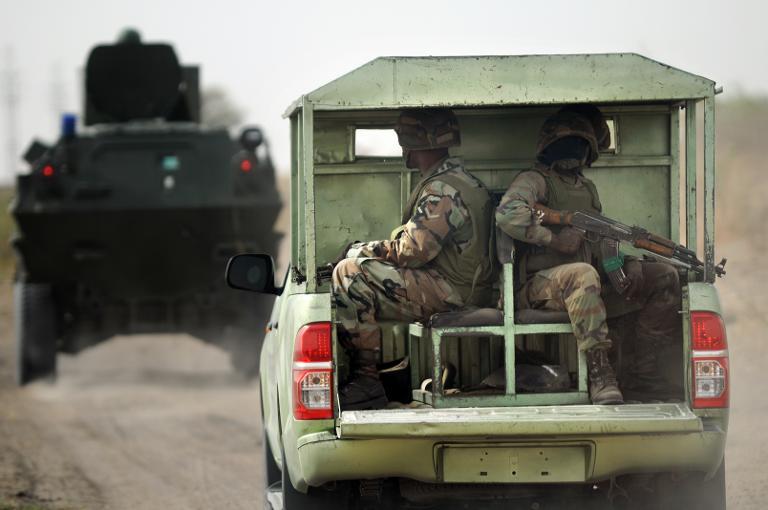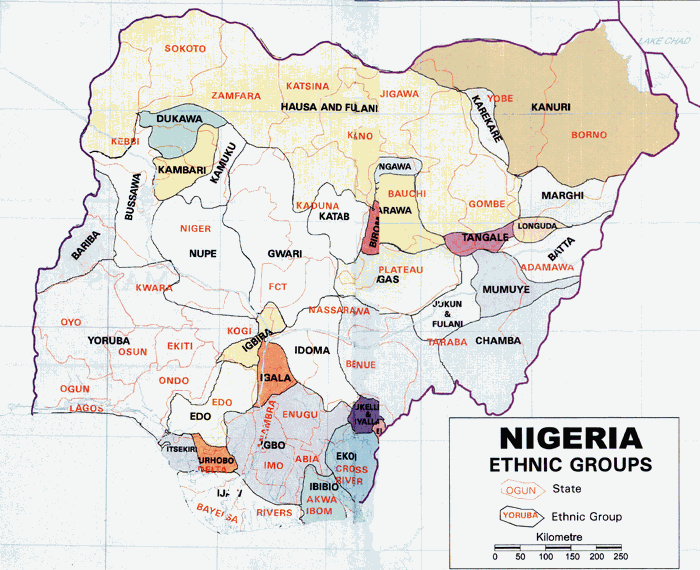
Nigerian soldiers patrol in Borno state close to a former camp of Islamist extremist group Boko Haram, on June 5, 2013 near Maiduguri (AFP Photo/Quentin Leboucher)
Abuja (AFP) – Nigeria’s military indicated on Thursday that it could follow the example of Sri Lanka in fighting terror, to bring an end to an increasingly deadly insurgency by Boko Haram militants.
A high-ranking military delegation from the South Asian island nation, led by Chief of Defence Staff General Jagath Jayasuriya, was in the capital, Abuja, to meet their Nigerian counterparts to share experience and expertise.
The visit came after Pakistan’s President Mamnoon Hussain held talks with his opposite number, Goodluck Jonathan, on Tuesday and the leaders pledged greater co-operation in defence and counter-terrorism.
A high-ranking military delegation from the South Asian island nation, led by Chief of Defence Staff General Jagath Jayasuriya, was in the capital, Abuja, to meet their Nigerian counterparts to share experience and expertise.
 The visit came after Pakistan’s President Mamnoon Hussain held talks with his opposite number, Goodluck Jonathan, on Tuesday and the leaders pledged greater co-operation in defence and counter-terrorism.
The visit came after Pakistan’s President Mamnoon Hussain held talks with his opposite number, Goodluck Jonathan, on Tuesday and the leaders pledged greater co-operation in defence and counter-terrorism.
Sri Lanka, with Jayasuriya as army chief, brought its decades-long civil war with ethnic Tamil Tiger rebels to an end in May 2009 after a devastating military onslaught.
But the country’s military has been dogged ever since by allegations that it killed 40,000 Tamil civilians in the terrifying final days of the conflict and claims, which it denies, that it committed war crimes.
According to a statement from Nigeria’s defence headquarters, Jayasuriya told delegates there were similarities between the security situation in Nigeria and Sri Lanka at the height of the conflict with the Tamil Tigers.
Nigeria’s Chief of Defence Staff, Air Chief Marshal Alex Badeh, said they were “seriously considering the counter-insurgency experience of the Sri Lankan military with a view to identifying those areas that could be operationally beneficial to Nigeria in its battle to defeat terrorism”, the statement added.
Sri Lanka was “acclaimed as having achieved the reputation of effectively defeating terrorism in its territory”, it added.
During a briefing session, the Sri Lankans told their Nigerian counterparts about “total security”, which was described as “the translation of all the nation’s assets into military power to counter the scourge of terrorism”.
“They suggested that the military needed to enjoy the support of the entire country in its efforts to counter terrorism,” defence spokesman Chris Olukolade said.
Nigeria’s military has been criticised for its handling of the five-year-long Boko Haram insurgency, with the militants apparently able strike at will across swathes of the northeast, with little resistance.
Human rights groups have also accused the army of committing atrocities, including the extra-judicial killing of Boko Haram suspects, as well as abuses including torture in detention facilities.
A state of emergency was imposed in the three northeast states worst-hit by the violence last May but initial apparent gains appear to have been lost, with Boko Haram holding sway over remote rural areas, forcing thousands to flee.
Nigeria’s military is currently leading the hunt for more than 200 schoolgirls kidnapped by Boko Haram on April 14, alongside international partners.